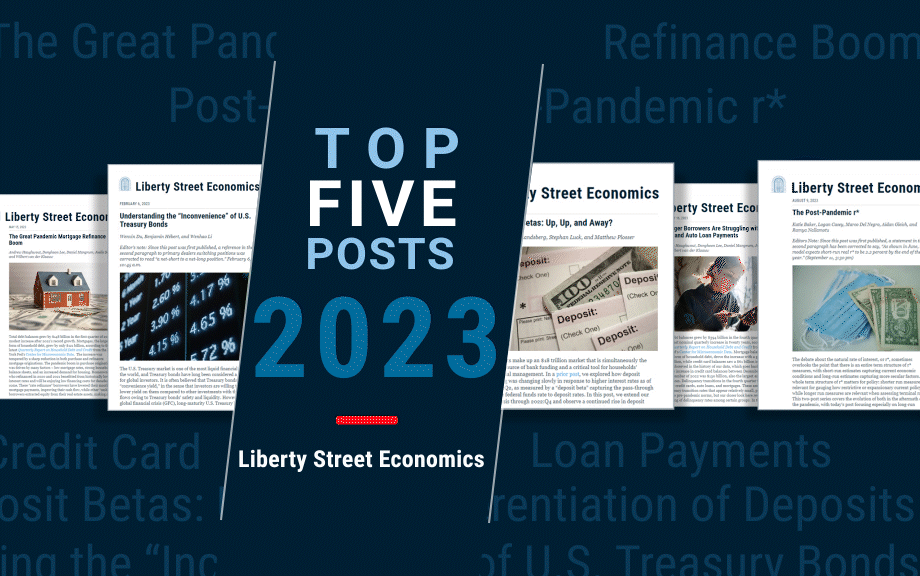Where Is R‑Star and the End of the Refi Boom: The Top 5 Posts of 2023

The topics covered on Liberty Street Economics in 2023 hit many themes, reflecting the range of research interests of the more than sixty staff economists at the New York Fed and their coauthors. We published 122 posts this year, exploring important subjects such as equitable growth and the economic impacts of extreme weather, alongside our deep and long-standing coverage of topics like inflation, banking system vulnerability, international economics, and monetary policy effects. As we close out the year, we’re taking a look back at the top five posts. See you again in 2024.
Does Trade Uncertainty Affect Bank Lending?

The recent era of global trade expansion is over. Faced with increased geopolitical risk, fragile foreign supply chains, and uncertainties in the international trade environment, firms are postponing entry into foreign markets and pulling back from foreign activities (IMF 2023). Besides its direct effects on real activity, the recent rise in trade uncertainty has potentially important implications for the financial sector. This post describes how the lending activities of U.S. banks were affected by the rise in trade uncertainty during the 2018-19 “trade war.” In particular, banks that were more exposed to trade uncertainty contracted lending to all of their domestic nonfinancial business borrowers, regardless of whether these borrowers were facing high or low uncertainty themselves. Furthermore, banks’ lending strategies exhibited the type of “wait-and-see” behavior usually found in corporate firms facing investment decisions under uncertainty, and the lending contraction was larger for those banks that were more financially constrained.
Dropping Like a Stone: ON RRP Take‑up in the Second Half of 2023

Take-up at the Overnight Reverse Repo Facility (ON RRP) has halved over the past six months, declining by more than $1 trillion since June 2023. This steady decrease follows a rapid increase from close to zero in early 2021 to $2.2 trillion in December 2022, and a period of relatively stable balances during the first half of 2023. In this post, we interpret the recent drop in ON RRP take-up through the lens of the channels that we identify in our recent Staff Report as driving its initial increase.
Hey, Economist! Outgoing Advisor Antoine Martin Reflects on How His New York Fed Perch Has Shaped His Work

Antoine Martin, an economist and financial stability advisor in the New York Fed’s Research and Statistics Group, will soon take up a new post at the Swiss National Bank (SNB), as head of its third department covering money markets/foreign exchange (FX). In that role, Martin, who is originally from Switzerland, also becomes one of three members of that central bank’s rate-setting governing board. Readers of Liberty Street Economics will be familiar with his byline, as he has written more than sixty posts presenting new research findings and policy analysis, all with an eye for breaking down the most complicated topics in clear terms. He took a few questions from publications editor Anna Snider about his experiences and future plans as he prepares to move on.
The New York Fed DSGE Model Forecast—December 2023

This post presents an update of the economic forecasts generated by the Federal Reserve Bank of New York’s dynamic stochastic general equilibrium (DSGE) model. We describe very briefly our forecast and its change since September 2023. As usual, we wish to remind our readers that the DSGE model forecast is not an official New York Fed forecast, but only an input to the Research staff’s overall forecasting process. For more information about the model and variables discussed here, see our DSGE model Q & A.












 RSS Feed
RSS Feed Follow Liberty Street Economics
Follow Liberty Street Economics